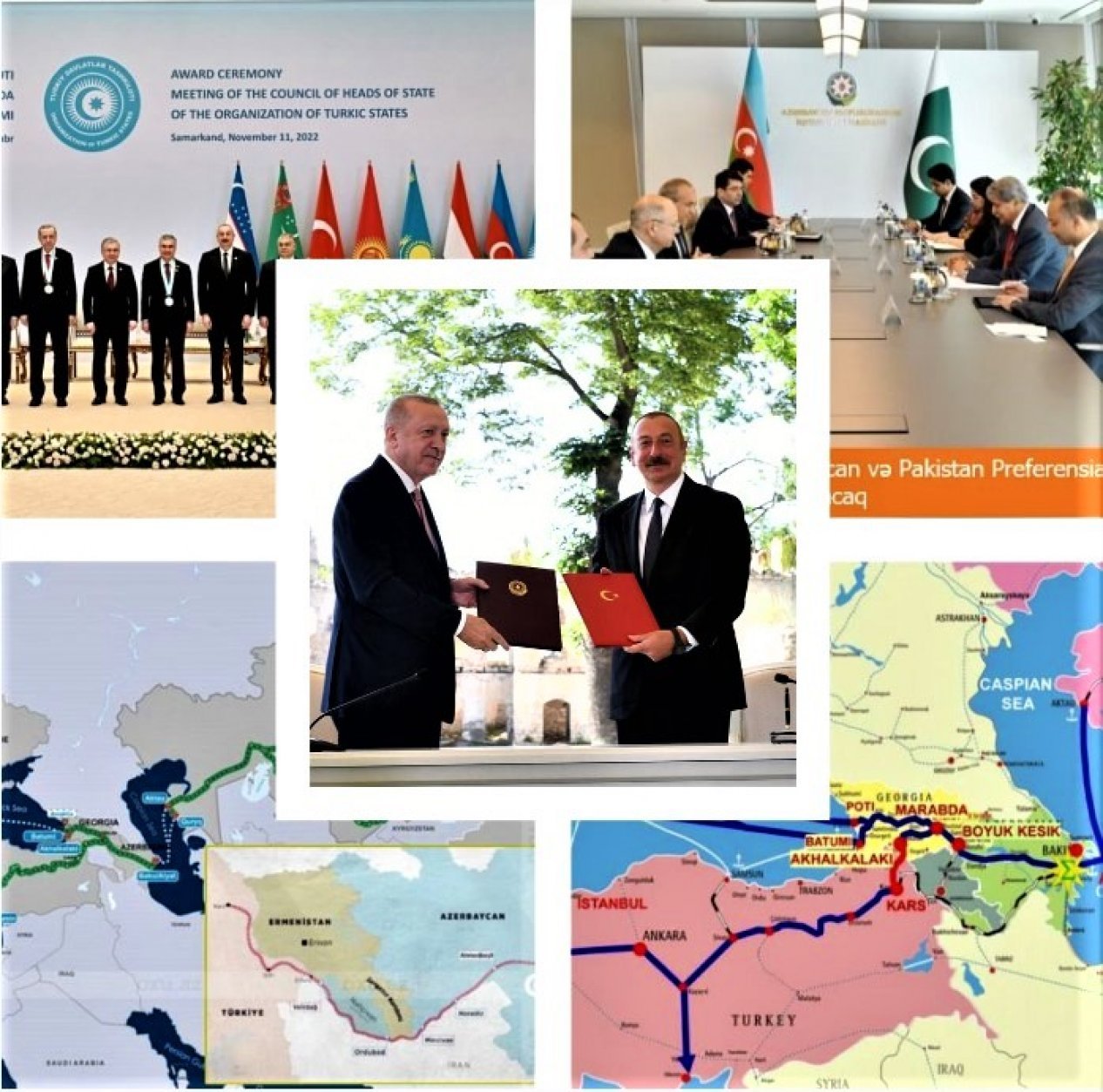
Azerbaijan and Turkiye have made new additions to the clauses of the Preferential Trade Agreement, which stimulate the increase of mutual trade, which is one of the main attributes of their major economic goals. On June 6, at the meeting of the Azerbaijani parliament, the scope of trade privileges was expanded by approving the additions and changes to the Protocol "On Amendments to the Preferential Trade Agreement between the Government of the Republic of Azerbaijan and the Government of the Republic of Turkiye".
What is the purpose of changes to the agreement?
Before the essence of the changes, let's give a brief information about "Preferential Trade Agreement". Agreements of this type envisage the reduction or elimination of tariffs on various goods, the elimination of para-tariffs and non-tariff barriers, the expansion and promotion of trade through the harmonious development of economic relations. The agreement is one of the economic tools that serve to accelerate the annual growth of the exchange of goods for countries that are closely allied with each other.
Azerbaijan and Turkiye signed the "Preferential Trade Agreement" on February 25, 2020 in order to diversify the trade built on the basic foundation and coordinate new market conjunctures. At the first stage, it was decided to reduce the customs duties applied to the mutual import of a number of agricultural and food products. According to the agreement, which came into force on March 1, 2021 after approval by the parliament and heads of state of both countries, 15 products were included in the nomenclature of the preferential goods group. reference
The two brotherly countries decided to further increase the scope of the concession package, taking into account the growing positive dynamics in trade and a number of needs, and taking into account the need to revise and expand the list of products covered by the agreement in order to benefit from mutual cooperation, they came up with a new initiative. During the meeting held on April 14, 2023, between the Minister of Economy of Azerbaijan Mikayil Jabbarov and the Minister of Trade of Turkiye, Mehmet Mus, the mentioned initiatives were supported and a protocol on the amendment to the "Preferential Trade Agreement" was signed. Reference
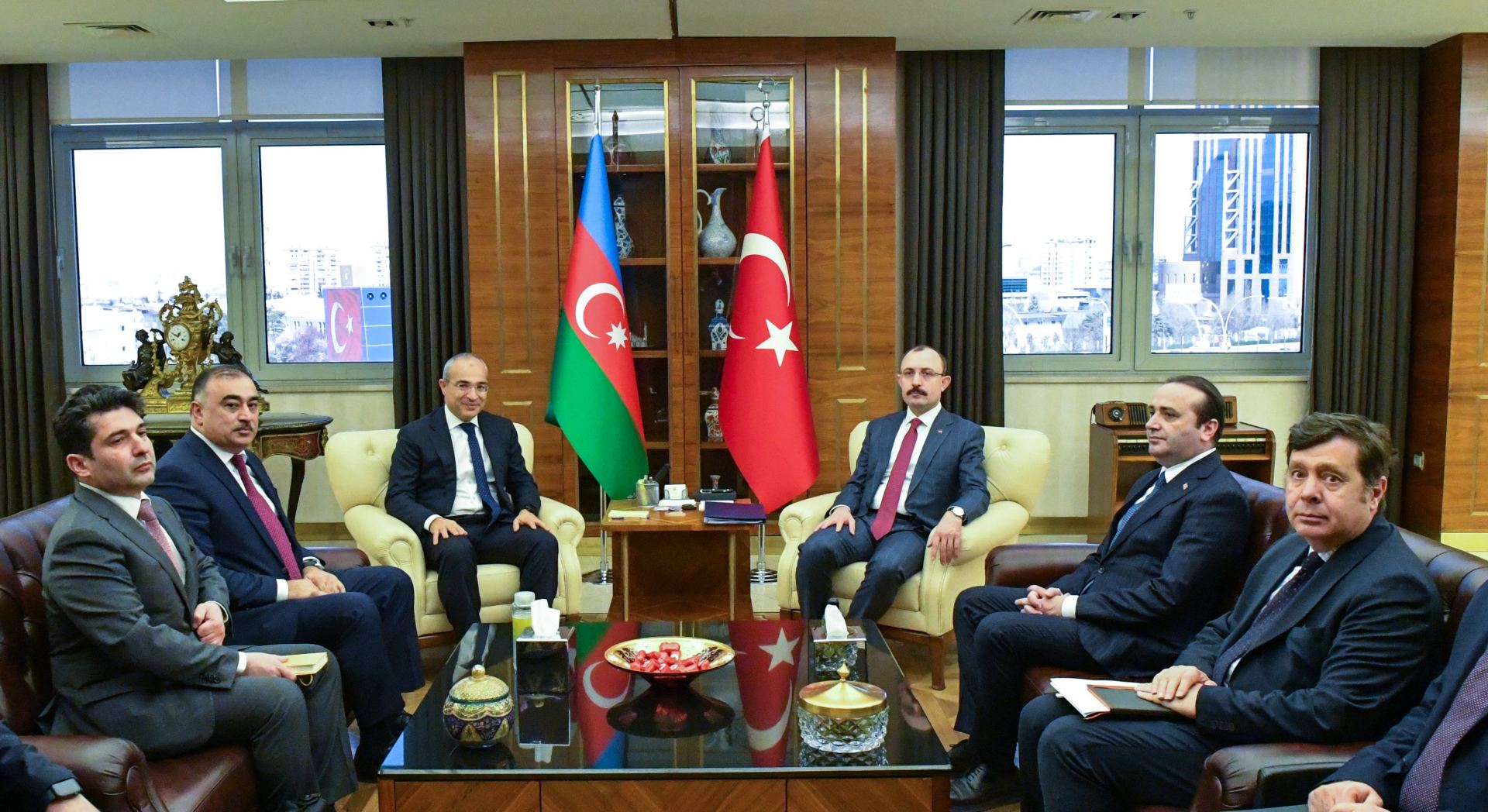
Thus, after the package of additions to the agreement was agreed upon by the government members of both countries, the project was submitted to the parliament and approved. Based on the new agreement, which will come into force after the approval of the document by the head of the state, an additional preferential regime for agricultural and other food products, as well as non-food products, will be applied in the coming days. It includes types of alcoholic beverages, semi-finished products, cardboard goods, packaging and wrapping equipment, various types of devices, etc. including goods. Thus, the range of products included in the preferential goods group will be increased from 15 to 30. reference
What importance will the additions to the preferential agreement have on trade and economic ties?
The main goal of Turkiye and Azerbaijan is to increase the volume of trade turnover to $10-15 billion. There are enough opportunities and resources for this and it is enough to increase mobility. The dynamics of mutual exchange of goods in the last two years confirms this. Thus, in 2022, the volume of commodity circulation between Azerbaijan and Turkiye was equal to $5.842 billion.
(Source: Customs statistics of foreign trade of the Republic of Azerbaijan. 2022. Page 30) In the first half of 2023, the volume of mutual goods turnover was $3.570 billion. That is, a trade volume of about $600 million is recorded per month. (Source: Customs statistics of foreign trade of the Republic of Azerbaijan. 2023. January-June, p. 30)
Current statistics and dynamics of mutual goods stipulate that the volume of annual trade turnover will reach $7 billion by the end of the year. Taking into account the 50 percent increase in the volume of trade in the past two years, there is no doubt that the volume of goods turnover will exceed $10 billion in the next two years.
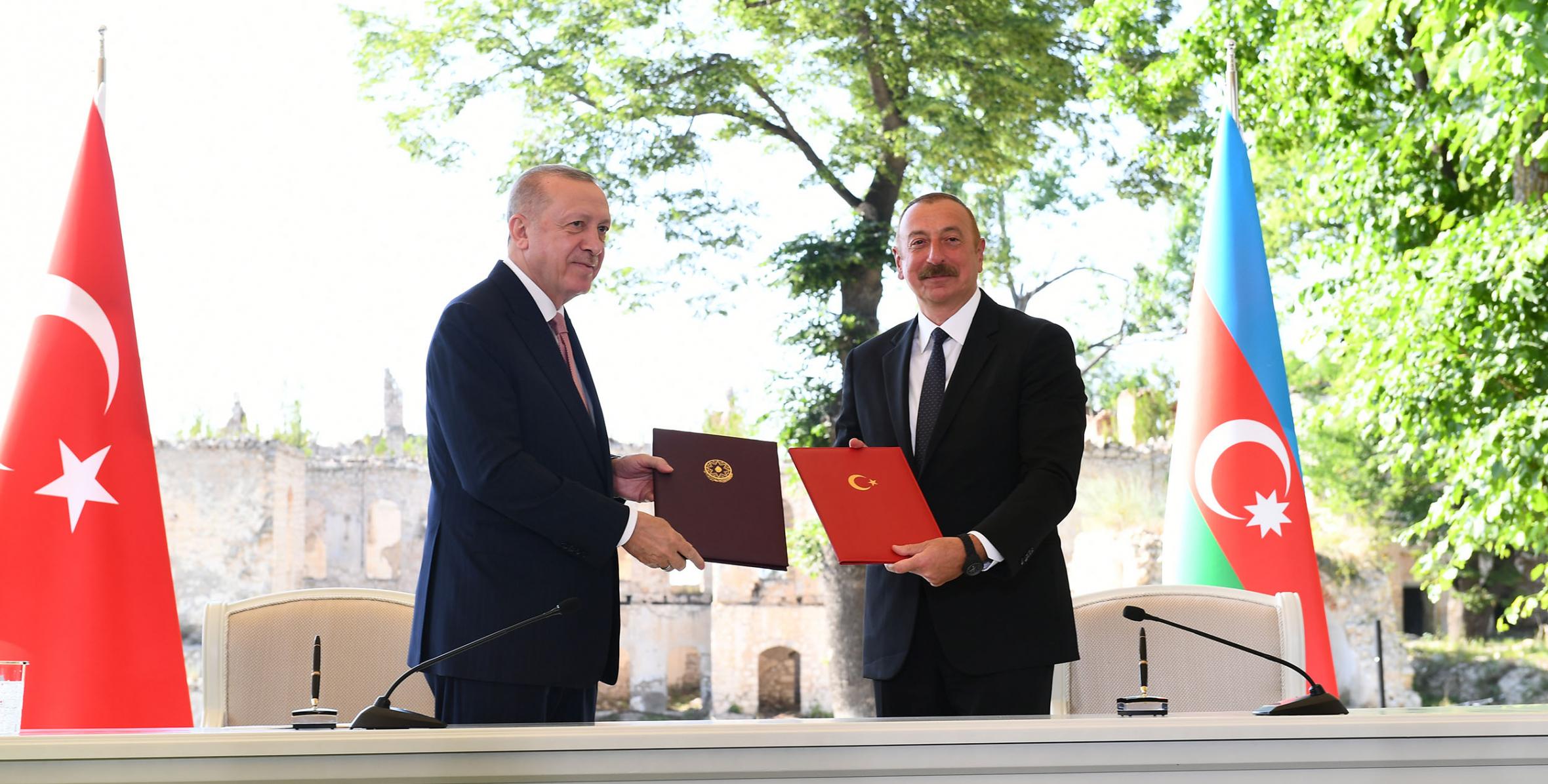
One of the fundamental state agreements aimed at increasing the trade turnover between Azerbaijan and Turkiye is the "Shusha Declaration on alliance relations between the Republic of Azerbaijan and the Republic of Turkiye". One of the most important points of the declaration defines the long-term road map of economic and trade links. In that paragraph, it is noted that "The parties will increase their efforts in the direction of diversification of their national economies and exports in trade and economic relations, as well as establishment of joint production in promising fields, development of more favorable conditions for mutually beneficial development of investment cooperation. In this regard, Azerbaijan and Turkiye will take measures to create mechanisms for organizing the free movement of goods."
As it can be seen, the free trade organization scheme, which is one of the main priorities of the Shusha Declaration, is in harmony with the spirit of the "Preferential Trade Agreement" and is focused on the same national goals.
Another importance of the agreement is that it plays a key role in establishing the commercial geography of Turkish regions and opens new ground. Azerbaijan and Turkiye played the role of a locomotive in the region and directly initiated the establishment of the trade chain of the Turkish states. As a result of this initiative, on November 11, 2022, the Samarkand Declaration "On the establishment of a simplified customs corridor between the governments of the Organization of Turkic States" was signed. Reference
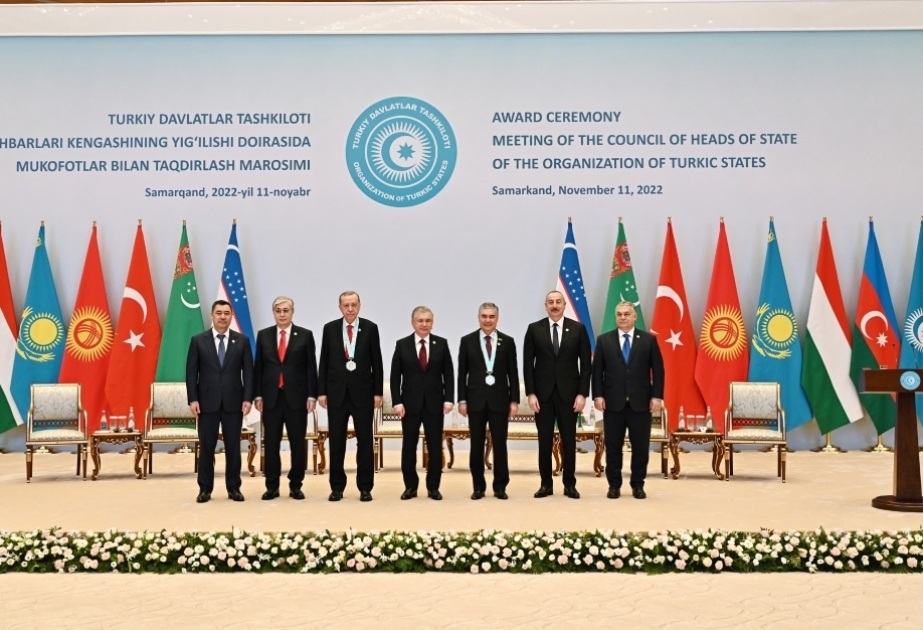
By defining the concept of free trade among the Turkic states, the Samarkand Declaration lays the groundwork for the formation of a new model of the World Trade Organization (WTO) in Turkish territory, "WTO+".
According to the agreement, the Turkic states intend to connect trade-transit networks in order to further expand cooperation in a multilateral framework. This multi-network transit family includes increasing the capacity of the Baku-Tbilisi-Kars railway line, expanding better transport connections between Europe and Asia, connecting new highways between Central Asia and Middle East, and finally, the imminent opening of the Zangazur Corridor. Zangazur Corridor, which is considered to be one of the key doors in transportation, serves the average interests and principles of each country as a transportation artery among the Turkic-speaking countries, being the intersection of both East-West and North-South corridors.
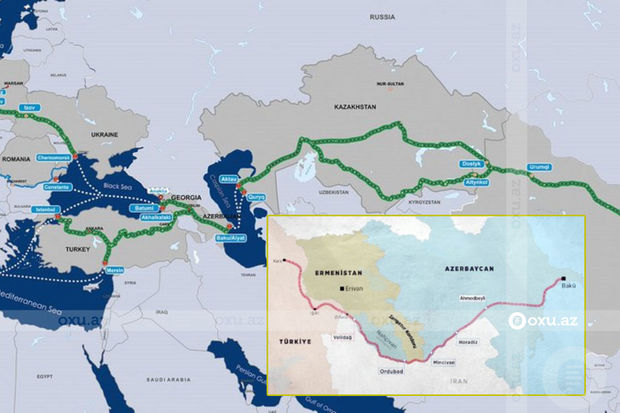
Thus, the philosophy and economic idea of the "Preferential Trade Agreement" and the Samarkand Declaration serve to increase mutual trade cycles and consolidate the Zangazur-Turkiye-Central Asia corridors under one umbrella against the background of the establishment of a free customs zone among Turkic-speaking countries.
Do the economic potential of the Turkic states, trade flows allow the creation of a free customs zone?
The figures in this table are encouraging and the vision of the future is optimistic. The economic resources of the Turkic-speaking countries with a large geography in Eurasia are quite large and rich. Undoubtedly, Turkiye has a leading position due to its economic potential and modern industrial development. Turkiye's annual GDP is $905 billion. (as of 2022). This number was $220 billion in Kazakhstan, $80 billion in Azerbaijan, $80 billion in Uzbekistan, $46 billion in Turkmenistan and $11 billion in Kyrgyzstan. In general, Turkic-speaking countries have a nominal GDP of $1.350 trillion. Reference
Regarding the annual foreign trade balance of the Turkic states, the indicators are presented in the table.
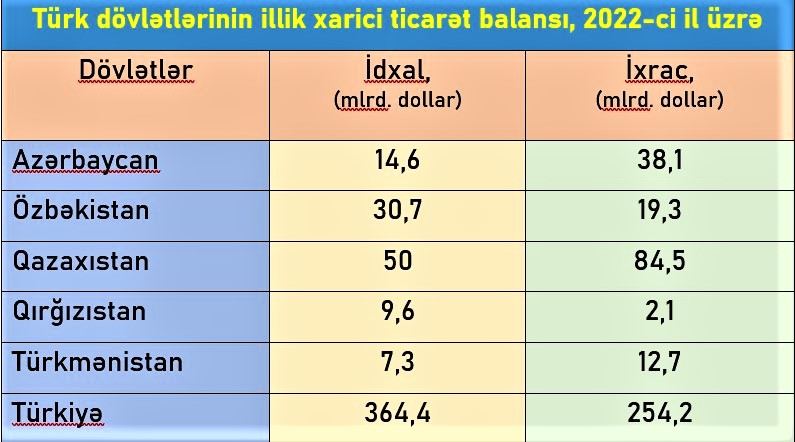
When preparing the table, tr.euronews, customs.gov.az, inbusiness.kz, review.uz, business.com.tm, trendeconomy were referenced.
Thus, the volume of the total foreign trade turnover of the above-mentioned Turkic states is approximately $900 billion. About 5 percent of this, i.e. $45 billion, is the share of trade transactions between Turkic states. The geography of the general trade of Turkic states includes Russia, CIS countries, Turkiye, China, South Korea, Middle East countries and European countries.
The main intersections of that geography are the areas covered by the currently formed New Silk Road states, where the main transits directly cover the Turkic states. That is, this means that thanks to the establishment of a free customs and trade platform, the Turkic states have the opportunity to build a large trade map by holding a dominant position at the intersection of all transit-highways in the Asia and Europe region. If we simplify even more, at least 10-15 percent of the turnover of $900 billion of the Turkic states, that is, $100 billion, can be divided among themselves.
After Pakistan, which considers itself a member of this family, joins this trade chain, it will increase the turnover even more. Pakistan fully supported Azerbaijan's initiative to sign a preferential agreement. reference
It is not excluded that the two largest powers in the trade portfolio of the Turkic states - China and Russia - also join this type of agreement. China is more interested in trade with the East, Central Asia and the Caucasus, the CIS region. As for Russia, faced with heavy Western sanctions, Moscow's need for the South Caucasus-Central Asia and Turkiye triangle is increasing in the conditions where its economic wires and transit lines are closed with the European Union. All three regions are a big arena for Russia, after that, the volume dynamics of trade relations and the number of product groups will undoubtedly increase. Therefore, it is quite possible for Russia to join the WTO+ format, which can be considered a free trade hub of Turkic states.
Thus, Preferential agreements create new opportunities for the formation of a multi-vector trade chain in the region in the example of the Turkic states and for the integration of other countries into this system. This is the essence of this wise policy, which the leaders of Azerbaijan and Turkiye thought with great foresight: to include the Asia-Europe economic-geographic belts directly in the sphere of influence of the Turkic states.
How will the preferential regime affect the prices of goods in the domestic market?
According to the agreement and the terms of the free customs zone, it is expected that the prices of the groups of goods that will be subject to concessions in mutual trade will decrease. That’s because the abolition of duties on privileged goods will reduce the duty cost of entrepreneurs and lower the cost of the product.
The signing of preferential trade agreements has an important role in the sustainable economic development of the country, the growth of non-oil exports, the expansion of the range of exported products, the strengthening of economic and trade partnerships, and the entry of Azerbaijan’s exporters into new markets with preferential terms.




















